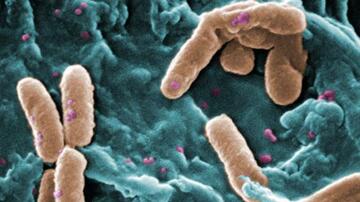When disciplines merge
Mark Brönstrup has been paving the way for new drugs against infectious diseases as a DZIF professor since the beginning of 2015.
From chemistry to biology to medicine—during the course of his career, Mark Brönstrup repeatedly crossed the boundaries between these disciplines. So it comes as no surprise that today he is head of the Department of Chemical Biology at the Helmholtz Center for Infection Research (HZI). Beyond this, he has been paving the way for new drugs against infectious diseases as a DZIF professor since the beginning of this year.
“I do actually rather regret not having engaged at all with biology earlier,” Prof Mark Brönstrup says with a grin. He therefore had a lot of catching up to do when his career path increasingly diverged from chemistry to biology. After studying chemistry in Marburg and at Imperial College in London, Brönstrup did his PhD in organic chemistry at the TU Berlin. He was passionate about mass spectrometers, which he did not use as detectors as was usual at the time, but as a reaction vessel for model chemical reactions. And it was mass spectrometry that brought him into the pharmaceutical industry straight after studying. Precisely this knowledge was in demand at the pharmaceutical company Aventis in Frankfurt.
According to Brönstrup, “Being confronted with biological questions is inevitable during pharmaceutical research.” He started engaging with cell biology during a research sabbatical at the Harvard Medical School. From 2005 to 2010, he was head of natural substance research at Sanofi-Aventis. His aim: to discover new active substances against infectious diseases and cancer from natural sources, and to optimise them to make them clinically useful. A chemical biologist was born, and it did not take long for Mark Brönstrup to add medicine to his repertoire. From 2010 to 2013, the central focus of his work at Sanofi was diabetes research and a quest for biomarkers.
Thirteen years later, he changed from the pharmaceutical industry to a public research institution. Mark Brönstrup has been leading the Department of Chemical Biology at the HZI since December 2013, and holds a professorship at the Leibniz University of Hannover, which was changed to a DZIF professorship at the beginning of 2015. “The position simply fits perfectly with what I have done and plan to do in future,” Brönstrup explains his change from Frankfurt to Braunschweig. And, surprising himself a little, he adds: “It is actually rather strange, as an official ‘civil servant’ I have more scope for action than I would in the pharmaceutical industry, which makes me feel entirely like an entrepreneur.”
So what is chemical biology about? “Using chemical probes, small molecules, to elucidate biological processes,” Brönstrup explains without hesitation, “and this is precisely my task at the DZIF.” He is officially assigned to the ‘Natural Compound Library’, which is part of the translational infrastructure and provides researchers at the DZIF with a large number of potentially promising natural substance samples. At the DZIF, Brönstrup looks for novel testing systems to analyse these samples, he also looks for lead compounds, and contributes to optimizing and developing novel active substances.
Brönstrup is certain, “The DZIF itself has what it takes to discover and test even new therapy options.” It provides an ideal environment for conducting translational research. So how does he understand the term? “For me, translation means testing results from basic research with regard to their treatment relevance.” He chooses his words thoughtfully and answers the questions calmly and assertively. “It is important not to equate translational research with applied research. First and foremost it is about understanding human pathogenesis and preventing it.” Mark Brönstrup has a lot of patience and energy for this. “Solving a scientific problem is of value in itself,” is how he explains his love of research. The fact that developing an active substance into a new drug can take about ten years does not play a big role for him.
There are a total of 30 members of staff currently working in his department. Brönstrup’s experience in the pharmaceutical industry and his interdisciplinary competencies make him a highly sought after advisor. And yet he makes time for his eight-year-old son and two-and-a-half-year old daughter. “I try not to go on too many business trips,” he explains. “And I have currently cut down my hobbies to ‘cycling trips’ from the city to my workplace in Stöckheim and a little bit of guitar playing.” A new instrument for Brönstrup, who, during his time in the compulsory military service, played clarinet in the military band of the German Armed Forces in Lüneburg. He settled in quickly in Braunschweig together with his family. “I like the city and was received very warmly at the HZI.”
“The four years I spent in translational medicine at Sanofi were an important experience and are of benefit to me now,” says Brönstrup, “there I could participate in intensive discussions with medical professionals and also learn their language.” This is an extremely valuable prerequisite for his work at the DZIF, “Because a big opportunity lies in bringing together clinicians who can define medical needs and niches with active substance researchers, which has not been fully exploited up to now:” Mark Brönstrup has now arrived at the HZI and the DZIF.


